Background
Nathaniel P. Willis was born on January 20, 1806, in Portland, Maine, the second child of Nathaniel Willis, Jr. and Hannah Parker. Six years later his father, Nathaniel Willis removed with his family to Boston.


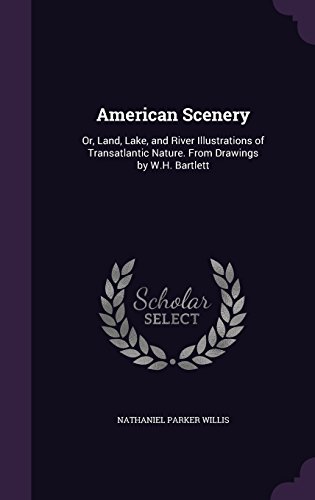
( This work has been selected by scholars as being cultura...)
This work has been selected by scholars as being culturally important, and is part of the knowledge base of civilization as we know it. This work was reproduced from the original artifact, and remains as true to the original work as possible. Therefore, you will see the original copyright references, library stamps (as most of these works have been housed in our most important libraries around the world), and other notations in the work. This work is in the public domain in the United States of America, and possibly other nations. Within the United States, you may freely copy and distribute this work, as no entity (individual or corporate) has a copyright on the body of the work. As a reproduction of a historical artifact, this work may contain missing or blurred pages, poor pictures, errant marks, etc. Scholars believe, and we concur, that this work is important enough to be preserved, reproduced, and made generally available to the public. We appreciate your support of the preservation process, and thank you for being an important part of keeping this knowledge alive and relevant.
https://www.amazon.com/American-Scenery-Illustrations-Transatlantic-Drawings/dp/1340699893?SubscriptionId=AKIAJRRWTH346WSPOAFQ&tag=prabook-20&linkCode=sp1&camp=2025&creative=165953&creativeASIN=1340699893
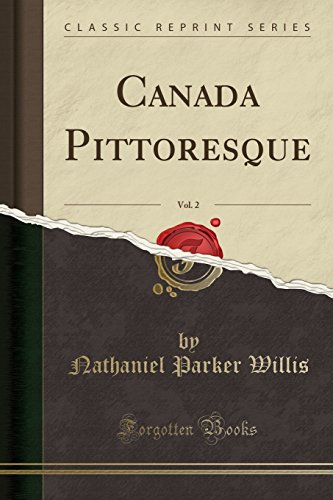
(Excerpt from Canada Pittoresque, Vol. 2 Le couvent des U...)
Excerpt from Canada Pittoresque, Vol. 2 Le couvent des Ursulines, fondé par madame de la Peltrie, en 1639, pour l'éducation des filles, est placé dans l'intérieur de la ville. A en juger par les dis positions intérieures, et le costume de la maison, il parait plus riche que l'hôpital général et l'hôtel-dieu. Dans le nombre des objets qui ornent la chapelle, nous remarquâmes particulièrement le crâne et les os d'un missionnaire, massacré par les sauvages qu'il cherchait à convertir. Lorsqu'on réfléchit cependant à l'indifférence que témoignent les Indiens pour les controverses religieuses, on est porté à douter que ce fût là l'offense véritable, qui attira sur ce ministre la couronne du martyre. Deux cents petites filles environ sont confiées aux soins des religieuses de ce couvent; mais je remarquai avec peine que leur éducation nuisait à leur santé: et toutes avaient une apparence de faiblesse et de souffrance provenant, sans doute, de ce qu'elles étaient renfemrées trop long-temps, pendant un long hiver, dans des salles fortement chaufïées par des étuves, et qu'elles étaient nourrice de salaisons, suivant l'usage général des Canadiens. About the Publisher Forgotten Books publishes hundreds of thousands of rare and classic books. Find more at www.forgottenbooks.com This book is a reproduction of an important historical work. Forgotten Books uses state-of-the-art technology to digitally reconstruct the work, preserving the original format whilst repairing imperfections present in the aged copy. In rare cases, an imperfection in the original, such as a blemish or missing page, may be replicated in our edition. We do, however, repair the vast majority of imperfections successfully; any imperfections that remain are intentionally left to preserve the state of such historical works.
https://www.amazon.com/Canada-Pittoresque-Classic-Reprint-French/dp/0282151478?SubscriptionId=AKIAJRRWTH346WSPOAFQ&tag=prabook-20&linkCode=sp1&camp=2025&creative=165953&creativeASIN=0282151478
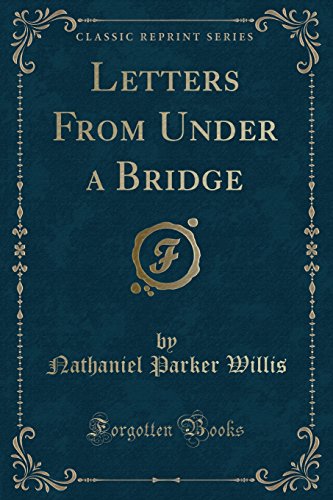
(Excerpt from Letters From Under a Bridge Call it. A syca...)
Excerpt from Letters From Under a Bridge Call it. A sycamore, Tom, and I'll come and see. It is a fine old trunk, but it shuts out the village spire. About the Publisher Forgotten Books publishes hundreds of thousands of rare and classic books. Find more at www.forgottenbooks.com This book is a reproduction of an important historical work. Forgotten Books uses state-of-the-art technology to digitally reconstruct the work, preserving the original format whilst repairing imperfections present in the aged copy. In rare cases, an imperfection in the original, such as a blemish or missing page, may be replicated in our edition. We do, however, repair the vast majority of imperfections successfully; any imperfections that remain are intentionally left to preserve the state of such historical works.
https://www.amazon.com/Letters-Under-Bridge-Classic-Reprint/dp/1330246659?SubscriptionId=AKIAJRRWTH346WSPOAFQ&tag=prabook-20&linkCode=sp1&camp=2025&creative=165953&creativeASIN=1330246659
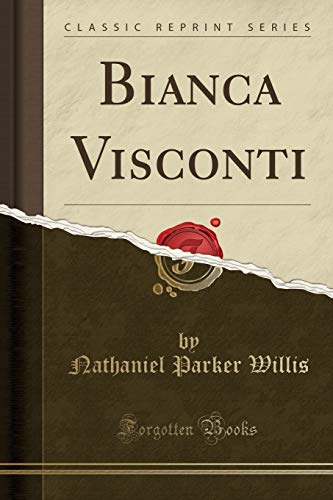
(Excerpt from Bianca Visconti Holy Virgin it is my mistre...)
Excerpt from Bianca Visconti Holy Virgin it is my mistress's page. An' Ibe found here now, I were as, qualified as Helen of Troy. About the Publisher Forgotten Books publishes hundreds of thousands of rare and classic books. Find more at www.forgottenbooks.com This book is a reproduction of an important historical work. Forgotten Books uses state-of-the-art technology to digitally reconstruct the work, preserving the original format whilst repairing imperfections present in the aged copy. In rare cases, an imperfection in the original, such as a blemish or missing page, may be replicated in our edition. We do, however, repair the vast majority of imperfections successfully; any imperfections that remain are intentionally left to preserve the state of such historical works.
https://www.amazon.com/Bianca-Visconti-Classic-Reprint-Nathaniel/dp/1330748182?SubscriptionId=AKIAJRRWTH346WSPOAFQ&tag=prabook-20&linkCode=sp1&camp=2025&creative=165953&creativeASIN=1330748182
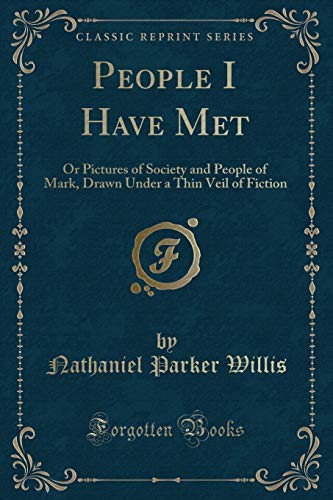
(Excerpt from People I Have Met: Or Pictures of Society an...)
Excerpt from People I Have Met: Or Pictures of Society and People of Mark, Drawn Under a Thin Veil of Fiction Real life is not as commonplace as it is represented. The contrasts, surprises, combinations, and novel situations, which some say are only found in plays, occur in every day society -with the difference, that those in a play are published to the world, while those in private life are known only to one or two. The dread of misrepresentation conceals from us most of the ma chinery of life, and all of its most wonderful occurrences, except now and then one that is disclosed by accident. He who fancies that he sees all that is dramatic. Even in the circle where he is most intimate, is like a deaf and mad man unconsciously present at a play. About the Publisher Forgotten Books publishes hundreds of thousands of rare and classic books. Find more at www.forgottenbooks.com This book is a reproduction of an important historical work. Forgotten Books uses state-of-the-art technology to digitally reconstruct the work, preserving the original format whilst repairing imperfections present in the aged copy. In rare cases, an imperfection in the original, such as a blemish or missing page, may be replicated in our edition. We do, however, repair the vast majority of imperfections successfully; any imperfections that remain are intentionally left to preserve the state of such historical works.
https://www.amazon.com/People-Have-Met-Pictures-Society/dp/1330947711?SubscriptionId=AKIAJRRWTH346WSPOAFQ&tag=prabook-20&linkCode=sp1&camp=2025&creative=165953&creativeASIN=1330947711
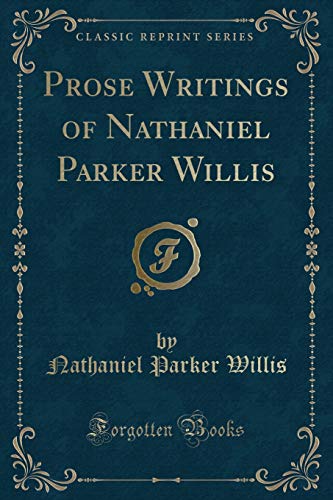
(Excerpt from Prose Writings of Nathaniel Parker Willis H...)
Excerpt from Prose Writings of Nathaniel Parker Willis Home J ournal. During all these years his pen was never idle, and he put forth volume after volume made up from his articles and correspondence in the columns of these periodi cals. A second and a third trip to Europe, visits to the South and West, to Washington, Cape Cod, Sharon Springs, and elsewhere, letters from Idlewild, his country-seat on the Hudson, studies of city-life, and miscellaneous papers of all kinds, furnished the contents of these books. They were good enough reading at the time, but altogether ephemeral, except now and then a poem or a short sketch which showed something of original inspiration, and rose above the general mediocrity of hack-work. More than half of the titles in this volume, and a great deal more than half of the amount of matter, have been taken from his three early books, Pencillings by the Way, Inklings of Adventure, and Letters from Under a Bridge. About the Publisher Forgotten Books publishes hundreds of thousands of rare and classic books. Find more at www.forgottenbooks.com This book is a reproduction of an important historical work. Forgotten Books uses state-of-the-art technology to digitally reconstruct the work, preserving the original format whilst repairing imperfections present in the aged copy. In rare cases, an imperfection in the original, such as a blemish or missing page, may be replicated in our edition. We do, however, repair the vast majority of imperfections successfully; any imperfections that remain are intentionally left to preserve the state of such historical works.
https://www.amazon.com/Writings-Nathaniel-Parker-Classic-Reprint/dp/1330909208?SubscriptionId=AKIAJRRWTH346WSPOAFQ&tag=prabook-20&linkCode=sp1&camp=2025&creative=165953&creativeASIN=1330909208

( This work has been selected by scholars as being cultur...)
This work has been selected by scholars as being culturally important, and is part of the knowledge base of civilization as we know it. This work was reproduced from the original artifact, and remains as true to the original work as possible. Therefore, you will see the original copyright references, library stamps (as most of these works have been housed in our most important libraries around the world), and other notations in the work. This work is in the public domain in the United States of America, and possibly other nations. Within the United States, you may freely copy and distribute this work, as no entity (individual or corporate) has a copyright on the body of the work. As a reproduction of a historical artifact, this work may contain missing or blurred pages, poor pictures, errant marks, etc. Scholars believe, and we concur, that this work is important enough to be preserved, reproduced, and made generally available to the public. We appreciate your support of the preservation process, and thank you for being an important part of keeping this knowledge alive and relevant.
https://www.amazon.com/Poems-Early-Nathaniel-Parker-Willis/dp/1377881989?SubscriptionId=AKIAJRRWTH346WSPOAFQ&tag=prabook-20&linkCode=sp1&camp=2025&creative=165953&creativeASIN=1377881989
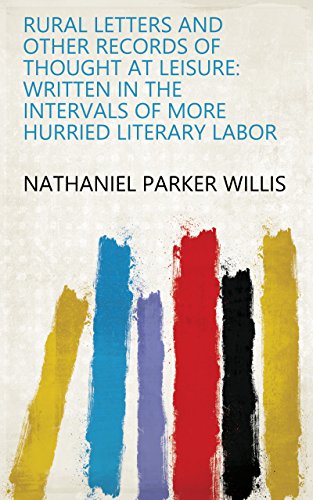
(This is a reproduction of a classic text optimised for ki...)
This is a reproduction of a classic text optimised for kindle devices. We have endeavoured to create this version as close to the original artefact as possible. Although occasionally there may be certain imperfections with these old texts, we believe they deserve to be made available for future generations to enjoy.
https://www.amazon.com/Rural-Letters-Records-Thought-Leisure-ebook/dp/B07CLGPDQT?SubscriptionId=AKIAJRRWTH346WSPOAFQ&tag=prabook-20&linkCode=sp1&camp=2025&creative=165953&creativeASIN=B07CLGPDQT
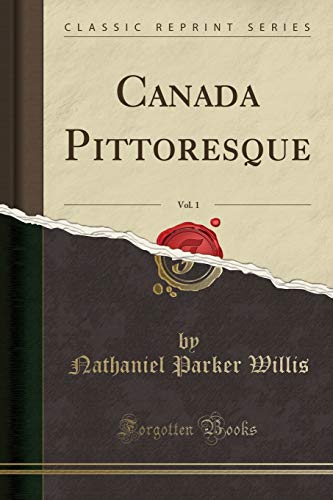
(Excerpt from Canada Pittoresque, Vol. 1 La Potherie part...)
Excerpt from Canada Pittoresque, Vol. 1 La Potherie partage cette opinion, avec la différence qu'il attribue l'idée que s'étaient faite les Espagnols du peu de ressources qu'offrait ce pays, à ce qu'il était couvert de neige. Il dit aussi que les Indiens, à l'arrivée de Jacques Cartier, répétaient fréquemment ces mots: Aca nada, rien ici, ce qui explique assez bien le nom actuel. Ces mots leur avaient été appris probablement par les Espagnols qui avaient visité la Baie des Chaleurs, et qui les avaient prononcés, parce que le pays ne leur paraissait pas avoir de mines d'or et d'argent. About the Publisher Forgotten Books publishes hundreds of thousands of rare and classic books. Find more at www.forgottenbooks.com This book is a reproduction of an important historical work. Forgotten Books uses state-of-the-art technology to digitally reconstruct the work, preserving the original format whilst repairing imperfections present in the aged copy. In rare cases, an imperfection in the original, such as a blemish or missing page, may be replicated in our edition. We do, however, repair the vast majority of imperfections successfully; any imperfections that remain are intentionally left to preserve the state of such historical works.
https://www.amazon.com/Canada-Pittoresque-Classic-Reprint-French/dp/028217057X?SubscriptionId=AKIAJRRWTH346WSPOAFQ&tag=prabook-20&linkCode=sp1&camp=2025&creative=165953&creativeASIN=028217057X
Nathaniel P. Willis was born on January 20, 1806, in Portland, Maine, the second child of Nathaniel Willis, Jr. and Hannah Parker. Six years later his father, Nathaniel Willis removed with his family to Boston.
Young Willis attended the Boston Latin School and prepared for Yale at Andover. In his seventeenth year his first verses appeared in his father's Boston Recorder, and while still an undergraduate at Yale, signing usually "Roy" or "Cassius, " he became nationally known as a poet. His verse paraphrases of Biblical themes were widely admired in the magazines, and a collection of them chiefly make up Sketches (1827), published in the year of his graduation.
After earning his degree Willis turned in earnest to journalism. For Samuel G. Goodrich he edited two issues of The Legendary (1828) and an annual, The Token (1829).
Striking out for himself in his twenty-third year, he established in Boston (April 1829) the American Monthly Magazine. The venture existed for two and a half years in spite of contrary prophecies from established rivals. Willis soon struck a stylistic pose which greatly offended his sober-minded critics. He pretended to write at a rosewood desk in a crimson-curtained sanctum; he invented a French valet, wrote of his ever-fresh japonica, and invited his readers to imagine themselves on a dormeuse with a bottle of Rudesheimer and a plate of olives before them. There is suggestive evidence that Poe's early burlesque, "The Duc de l'Omelette, " is aimed good-naturedly at the audacious young editor, but most of his critics were unamused in denouncing his literary and personal affectations.
Quitting his magazine and Boston for New York, Willis formed an association with George Pope Morris, who was editing the New-York Mirror. A plan was soon conceived to send Willis abroad as a foreign correspondent. Five hundred dollars were found for his first expenses, and Morris promised ten dollars for each weekly letter written for the Mirror. The twenty-five-year-old Willis of this time was later recalled by Oliver Wendell Holmes as "young and already famous. "
Willis had, indeed, increased his fame by publishing two more books, Fugitive Poetry (1829) and Poem Delivered before the Society of United Brothers (1831), but even though he was conscious of his handsome appearance, his elegant taste in dress, and his ability for meeting and pleasing people of importance, he could scarcely have dreamed of the dazzling adventures which lay before him. The speculative trip extended for nearly five years, and he became for the time, Irving and Cooper excepted, the most famous American man of letters abroad. The details of his travels may be followed in the letters, collected as Pencillings by the Way (1844), which appeared irregularly in the Mirror from February 13, 1832.
After a six months' cruise on the Mediterranean he made his way to England, arriving at Dover, June 1, 1834. Offers from English periodicals awaited him, and he was soon contributing over the signature "Philip Slingsby" to the Metropolitan Monthly, the Court Magazine, and the New Monthly. Willis' success in England was marred by his indiscretions in too freely reporting his observations to his American readers.
He left England for America in May 1836. Before sailing he had published a collection of the "Slingsby" papers as Inklings of Adventure (3 vols. , 1836). By this time he was among the best paid of American writers, but he seems not to have been able to trust journalism to supply a livelihood. He tried in vain for a diplomatic secretaryship and soon turned his talents to a new field.
His play, Bianca Visconti (1839), a tragedy, was produced with moderate success at the Park Theatre in New York on August 25, 1837. "The Kentucky Heiress" was a stage failure, never published. With Tortesa, or the Usurer Matched (1839) he was more fortunate. He also continued to travel and write for the Mirror, dating his sketches from Washington, where he described Van Buren's inauguration, and from Niagara, where he had gone to prepare the letter-press for American Scenery (2 vols. , 1840).
During these travels he discovered and bought an estate on Owego Creek, and established there a country home, "Glenmary. " From this retreat he wrote for the Mirror "Letters from under a Bridge, " collected as A l'Abri; or, the Tent Pitch'd (1839). A difference with Morris, the only obvious rift in their long friendship, now prompted Willis to join Dr. T. O. Porter in establishing the Corsair, a short-lived weekly (March 16, 1839 - March 7, 1840), significant in the fight for an international law of copyright.
The management was left to Porter, Willis sailing for a second visit to England, this time to be gone but a year. His Pencillings by the Way had reached a fourth London edition, and Loiterings of Travel (3 vols. , 1840) was soon on the English market.
Upon his return home in the spring of 1840, rates considered widely munificent were paid him by Graham's, Godey's, and other periodicals. He was forced, however, by a press of circumstances to give up his country estate, doing so with a deep regret wistfully expressed in the once-famous "Letter to the Unknown Purchaser and Next Occupant of Glenmary. "
Removing to New York, he rejoined Morris, and as editors of the New Mirror, a weekly, soon changed to the Evening Mirror, a daily, they began a partnership lasting until Morris' death. Willis regularly contributed his own poems, stories, and miscellaneous papers. The poems were chiefly vers de sociate, but among them was his effective "Unseen Spirits".
His good fortune was tinged with sorrow by the death of his mother and of his wife. Seeking solace, he embarked for a third and last journey to England and the Continent. His Dashes at Life with a Free Pencil (1845) had gone to press before he left America, and his "Invalid Letters from Europe" were collected in Rural Letters (1849) and in Famous Persons and Places (1854). Morris in the meantime had withdrawn from the Evening Mirror, and upon Willis' return in 1846 he joined Morris in his National Press, which they renamed the Home Journal, their final and most prosperous engagement.
Later he began an active life in New York, portraying the news of fashion with Pepysian acumen for the Home Journal and becoming himself a colorful part of the daily Broadway scene.
In 1852 slowly failing health sent him to Bermuda and the West Indies, which brought more travel letters collected as Health Trip to the Tropics (1853). With the single exception of his one and unsuccessful novel, Paul Fane (1857), his books were almost wholly made up from his magazine pieces, but for most of them there was a demand for simultaneous editions in England and America. More remarkable, he was able to sell reissues of his earlier work in new editions with new titles; practically all his short stories were republished after 1850 in People I Have Met (1850), Life Here and There (1850), and Fun Jottings (1853).
In further search of health, in 1853 he again set up a country seat, "Idlewild, " not far from Irving's "Sunnyside" on the Hudson. Through his weekly letters to the Home Journal "Idlewild" became a celebrated place, and there were famous visits from Bayard Taylor, Charles A. Dana, James T. Fields and others, including his neighbor, Washington Irving.
The Civil War brought Willis to Washington as the Home Journal's correspondent. His name gave him social right of way, and he became a pronounced favorite with Mrs. Lincoln, but his kind of genius found little inspiration in the troubled capital.
Willis was very sick in these final years: he suffered from violent epileptic seizures. He died on January 20, 1867, on his sixty-first birthday, and was buried in Mount Auburn Cemetery in Cambridge, Massachusetts.
(Excerpt from People I Have Met: Or Pictures of Society an...)
( This work has been selected by scholars as being cultura...)
( This work has been selected by scholars as being cultur...)
(This is a reproduction of a classic text optimised for ki...)
(Excerpt from Prose Writings of Nathaniel Parker Willis H...)
(Excerpt from Bianca Visconti Holy Virgin it is my mistre...)
(Excerpt from Letters From Under a Bridge Call it. A syca...)
(Excerpt from Canada Pittoresque, Vol. 2 Le couvent des U...)
(Excerpt from Canada Pittoresque, Vol. 1 La Potherie part...)
Quotations:
"Gratitude is not only the memory but the homage of the heart- rendered to God for his goodness. "
"The smallest pebble in the well of truth has its peculiar meaning, and will stand when man's best monuments have passed away. "
"The taste forever refines in the study of women. "
"Vulgarity is more obvious in satin than in homespun. "
Nathaniel Parker Willis was tall; his hair, of light brown color, waved in luxuriant abundance.
On October 1, 1835, Nathaniel Parker Willis married Mary Stace, by whom he had two children.
On October 1, 1846, he married Cornelia Grinnel, they had one child.
Nathaniel Willis, Jr. was an American editor and journalist. On July 21, 1803, Nathaniel Willis, Jr. married Hannah Parker, they had nine children. After the death of his first wife, he married Mrs. Susan Douglass.
Sarah Payson Willis was an American writer, who was the first woman to have a regular newspaper column.
In 1810, Susan Capen married Francis Douglass. After the death of her husband, she remarried Nathaniel Willis, Jr.
George Pope Morris was an American editor, poet and songwriter.
Richard Storrs Willis was an American composer, notably of hymn music.
